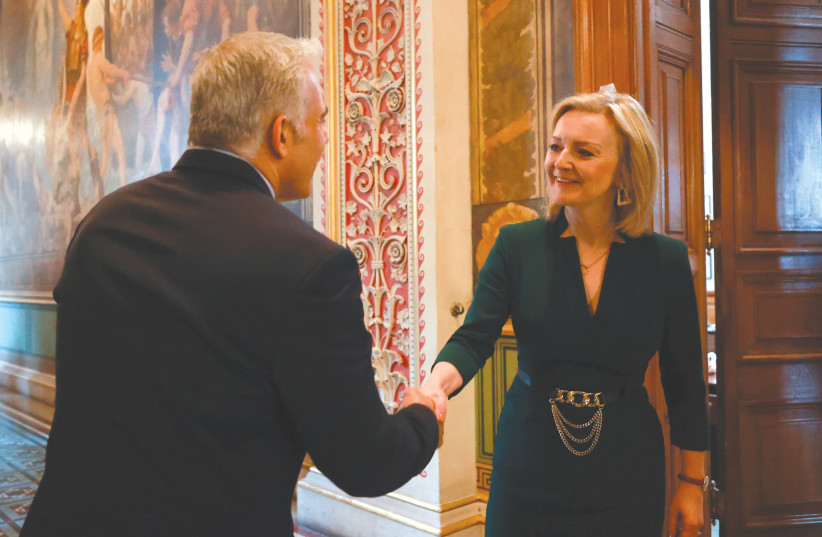Israel is often perceived as a nation standing alone, firm against a hostile sea of determined enemies, depending only on her own resources and the support of the US to survive as a sovereign nation. Yet, any analysis of the relationship between the United Kingdom and Israel shows a series of interwoven interests and of mutual support in many fields.
Israel has a very loyal and engaged friendship with this country, a relationship that is infrequently recognized as being of immense benefit to both.
The recently-signed memorandum of understanding between Israel and the UK clearly describes a roadmap that will enhance and deepen cooperation across many areas. From increased diplomatic consultations, further cooperation in defense and security, a UK-Israel innovation summit and plans for a new free trade agreement, this roadmap is extremely ambitious and will elevate the current relationship to new levels.
Its focus on technology, health, cyber where Israel will become a Tier One partner, and on science is testament to the global leadership position Israel holds in many digital, medical and new economy fields, and through exchange, cooperation and deeper connectivity, so each country will benefit from enhanced productivity and faster economic growth.
Collaboration on climate innovation will assist both countries, as well as the wider global community in achieving Net Zero target following COP26 and there is a wider Development track supporting development of low and middle income countries.

The memorandum is a great testament to the friendship and shared outlook of both countries and will deliver enormous benefits over the next 10 years, as it builds on current levels of trade currently worth nearly £5 billion (NIS 21.2 b.). UK businesses will have opportunities in healthcare, education, the development of Tel Aviv’s new metro project and in many other commercial fields. The roadmap also recognizes the need for further collaboration on the 2000 United Nations Security Council Resolution 1325 on women, peace and security and on the wider issue of gender equality. It is a truly broad and far reaching agreement.
As the UK and Israel relationship is elevated to a strategic partnership, so do further opportunities to work together will develop. The recent creation of the UK Abraham Accords group is a great example of how the UK can play an extremely valuable role in bringing peace and prosperity to the wider Middle East. As former foes forge peace, plans are afoot for the UK to enter three-way joint ventures with the UAE and Israel. Liam Fox MP who recently led a delegation to the UAE is determined that the UK could play “an important role in expanding the accords” and the visit which included members of the three main British political parties has established new areas of communication and cooperation between Israel and the Abraham Accords countries and was a great success.
Whilst recognizing the need for peace in the Middle East and the need for a two-state solution, the UK has not been naïve in its approach to the conflict. Last December, Home Secretary Priti Patel passed legislation declaring that the political wing of Hamas should be declared a terrorist organization, which brings it into line with the already proscribed military wing. This proscription is also aimed at reducing the evil of antisemitism, propagated by Hamas. And during the last Gaza conflict, the British government recognized the threat that Israel was under when attacked by missiles from Gaza. James Cleverly the, Middle East minister, was very clear that Israel has a “legitimate right to defend itself.”
The UK is equally robust in trying to ensure that Iran does not go nuclear and last November the Foreign Secretary Liz Truss wrote together with Yair Lapid that both countries will “work night and day” to prevent Iran from becoming a nuclear power. All these actions are concrete evidence of the extremely supportive relationship this country has with Israel, and whilst it may under certain situations urge compromise and restraint, it is as a critical friend and well-meaning ally that its comments are heard.
For over 100 years since 1917 when the British government signed the Balfour Declaration supporting the establishment of a national home for the Jewish people, this country has had a special relationship with this part of the Middle East. It is true that the relationship has not always been smooth and, especially in the pre-state years, was a cause of much conflict. Yet, since the establishment of Israel, the relationship has been on an upwards trajectory.
It is now firmly established to both countries mutual benefit and shared interest over so many areas. During these uncertain geopolitical times, it is more critical than ever that the ties that bind democratic liberal countries are cemented into relationships of enduring value and joint commitment to each other’s peace and prosperity. Our shared moral values will allow Israel and her neighbors to look forward to a future where people can live better, healthier, longer and happier lives.
The author is the chairman of the Jewish Leadership Council in London.
